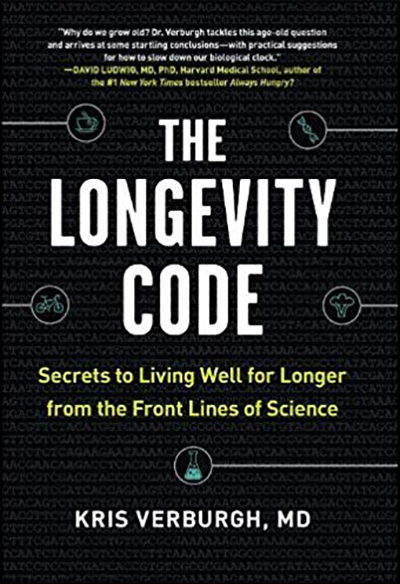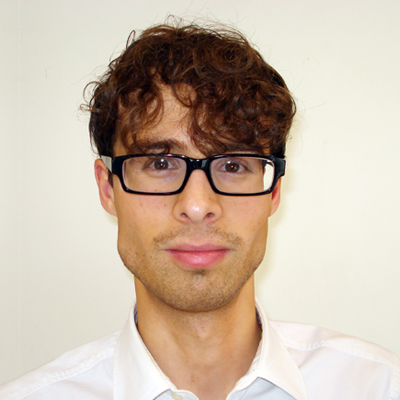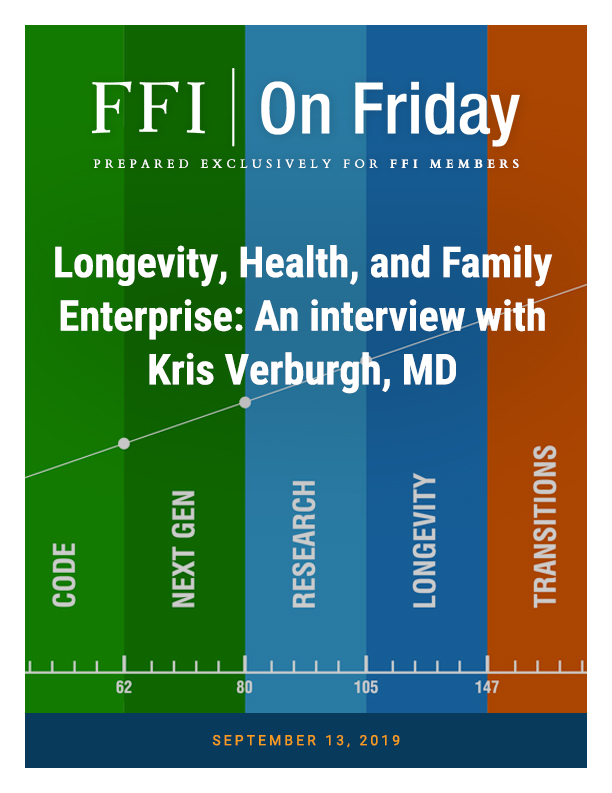e are extremely pleased to feature an exclusive interview with Dr. Kris Verburgh, who will be leading a master class in London on September 24 and giving the opening keynote presentation at the Miami conference on October 23. The topics discussed here and at these two educational events are on the forefront of science, business, philanthropy, scholarly research, and much more. We hope you enjoy this unique FFI member benefit.
At the present time, most people have a 3-stage life: they get an education, then work for a couple of decades, and then retire. When lifespans will be 200 years, people will do a study, then have a job, followed by a micro-retirement for a few years, and after that they get a different education, do a totally new kind of job for a few years or decades, followed by another micro-retirement, and so on.
It is also important to keep in mind that people will not only live much longer, but they will also look much younger, and still be very productive and active. So, the goal of current longevity research is to reprogram, or reverse, aging, so that people would eventually become 150 years old, but still look like 35 years or so.
We have seen in animal studies that it’s possible to reverse aging. In fact, it seems that the information encoding a young state is still stored in the biochemistry of the body, only the cells cannot access it anymore in a proper way, so they need a nudge in the right direction to rejuvenate themselves. In short, family enterprises and companies should take into account that people will live much longer and stay healthy and active for a much longer time than ever before in human history.
Biohackers are already using new gene editing technologies to reprogram their body, for example to get more muscle mass or fight HIV. There are companies that use AI to calculate polygenic risk scores to screen for pre-implantation embryos which have the least risk of getting heart disease or diabetes later in life. It’s a small step from here to use this technology to screen for embryos which will be the smartest, or the tallest. Also, how accurate are these predictions? What are the shortcomings of applying AI to predict traits and disease risk based only on the genome? And what about privacy? AI algorithms are being developed that analyze your voice to predict your risk of heart disease or cognitive decline. So next time you call your health insurance company for a general question, they could analyze your voice to assess your future health.
Or take precision medicine and new curative cancer therapies, which can be very effective, but which are almost prohibitively expensive. Not to mention the first treatments that will reverse aging. There is the risk that for the first time in human history, economical inequality can be translated into biological inequality, leading perhaps to a biological aristocracy that has access to the best health and rejuvenation therapies, while others are excluded. We must make sure new biotechnologies will benefit everyone and not just a few.
However, instead, many pharmaceutical companies focused on small downstream aspects of Alzheimer’s disease, like tweaking a protein that is involved in the breakdown of one of the several proteins that accumulate during the disease. It’s like trying to tinker with one very small little cogwheel in the huge complex machinery of Alzheimer’s disease, which in the end is caused by the wearing out of the metal itself as time passes. Some promising avenues to address Alzheimer’s are therapies that act on aging itself, like reprogramming the epigenome of brain cells, rejuvenating the mitochondria, upgrading the lysosomes so that they can break down the proteins and other junk that accumulate in the aging brain cells, and so on.
Other companies focus on AI to chart the pathways involved in Alzheimer’s, or to map out the Parkinson’s, which are all the different mechanisms involved in the origin of Parkinson’s disease, ranging from dysfunctional lysosomes and mitochondria in brain cells to the gut microbiome and systemic blood vessel stiffness.
Currently, the best ways to reduce our risk of getting Alzheimer’s is to pay attention to our diet, exercise, supplements, sleep patterns, and stress levels. Maintaining a healthy lifestyle is very important for your brain. One reason for this is that the brain is metabolically very active, so it is very dependent on many micronutrients to function properly, such as vitamins, minerals and omega-3 fatty acids. Also, the brain processes sugars differently compared to other tissues, so it’s very sensitive to unhealthy food, especially too much sugar. It’s no surprise that some scientists call Alzheimer’s disease “type 3 diabetes.”


15
view details
24
Host: KPMG LLP, 15 Canada Square, London, England
Program: Master Class with Dr. Kris Verburgh, author of The Longevity Code and keynote speaker at the FFI Global Conference
view details
1
view details
23-25
14
Host: J.P. Morgan, 390 Madison Avenue, New York City
Program: Master Class with Justin Blake, Edelman, “Implications on Trust for Family Businesses”

